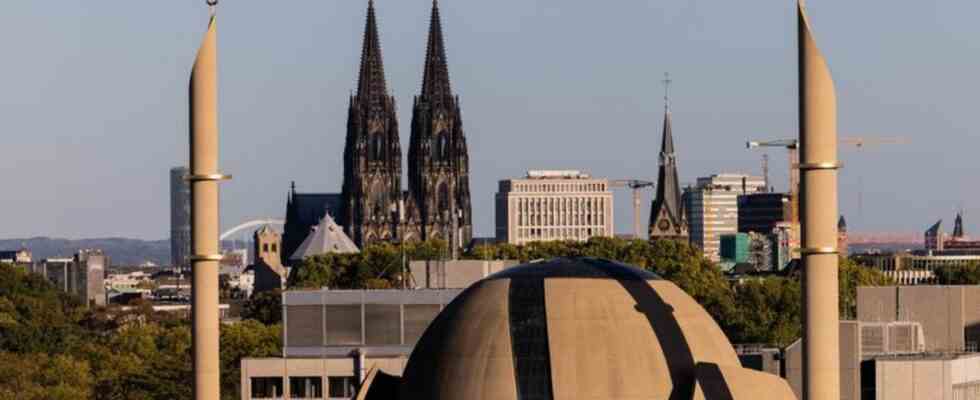religion
First muezzin call in Cologne: “Socially arrived”
The minarets of the central mosque of the DITIB reach into the sky in front of the towers of the Cologne Cathedral. photo
© Rolf Vennenbernd/dpa/Archive
Is the muezzin call an expression of religious freedom or a demonstration of the power of political Islam? Opinions on the pilot project at the Cologne Central Mosque differ.
At the central mosque of the Turkish-Islamic Union Ditib, the muezzin calls to prayer for the first time this Friday (1:24 p.m.) via loudspeakers. The call should last a maximum of five minutes and should only be heard in the immediate vicinity of the mosque. The local residents are only allowed to hear it at a volume of 60 decibels.
“The innovation is that the call to prayer can now also be heard on the mosque forecourt in front of the prayer hall,” said Murat Şahinarslan from Ditib of the German Press Agency. So far, calls have always been made in the prayer hall itself on Fridays. The caller this Friday is Mustafa Kader, Ditib’s religious officer.
Abdurrahman Atasoy, deputy chairman of the Ditib federal association, said they were “very happy” about the contract concluded with the city of Cologne. “The public call to prayer is a sign of the homeland of Muslims.” From “invisible and wasteful backyard mosques” they have now made it into the mainstream of society. “The core message of this long process is that Muslims, with their representative mosques as a visible part and with their call to prayer as an audible part, have finally arrived and been accepted by society.”
freedom of religious practice
The city of Cologne had already announced last year that mosque communities may call their believers to prayer upon request and subject to conditions. For the time being, this is a pilot project limited to two years. Mayor Henriette Reker (independent) refers to the freedom of religious practice enshrined in the Basic Law. While the bells rang in churches to call the faithful to the service, in the mosques it was the calls of the muezzin.
The Berlin Islamism expert Ahmad Mansour has criticized the muezzin call as “a demonstration of the power of political Islam”. He reminded that Ditib is the extended arm of the Turkish religious authority in Ankara and that President Recep Tayyip Erdogan personally opened the central mosque in Cologne-Ehrenfeld in 2018. “It is devastating when this organization of all people is now being given such public recognition,” said Mansour of the German Press Agency.
The author and psychologist criticizes in particular that Reker’s decision was simply announced without any prior discussion having taken place. Of course, everyone is in favor of freedom of belief. “But to simply place the muezzin call in this context is criminally naïve.”

